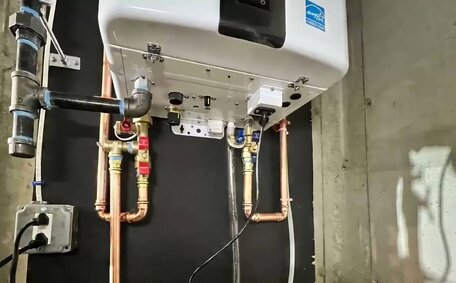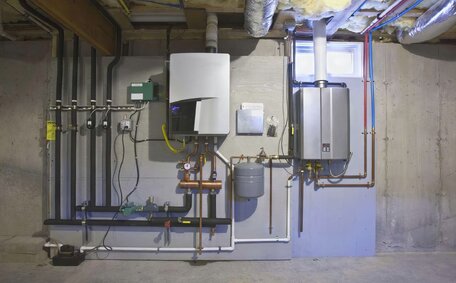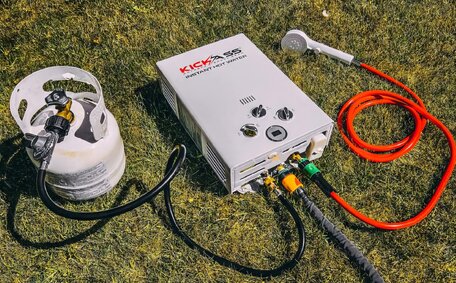Understanding Why You’re Running Out of Hot Water
Several factors can lead to a depletion of your hot water supply more quickly than usual:
- Your system is too small - If your hot water system is undersized for your household’s needs, it may not be able to keep up with demand, causing hot water to run out.
- Lack of maintenance - Various issues can cause interference with your system’s ability to properly heat water, such as sediment buildup, faulty heating elements, or broken components.
- Mechanical failure - Components like heating elements, thermostats, and gas valves can stop working over time, leading to running out hot water supply problems.
- Energy supply problems - For gas-powered systems, a gas leak or malfunctioning pilot light can cut off your household’s supply of hot water. For electric water heater systems, you may experience no hot water when there’s a circuit breaker trip causing heating issues.
Many people are perplexed when their tank water heaters with dual heating elements still run out of hot water. If one heating element fails, there’s no question that my hot water tank still heat some water, but its capacity shrinks, leading to quicker depletion. Knowing how to restore your hot water or why its flow has lessened is critical for our technicians to accurately diagnose and fix your system.
Checking if Your Hot Water System is Too Small
Should your gas water heater fail to meet demand, assess your tank’s capacity according to the number of people in your household and their water usage. Systems are sized based on the number of occupants and number of bathrooms. Typical sizing is as follows:
- 1-2 people with 1 bathroom: 30-40 gallon heater
- 2-3 people with 2 bathrooms: 40-50 gallon heater
- 4 or more people with 2+ bathrooms: 50+ gallon
Moreover, the size of your water heater’s tank along with water pressure can affect your shower’s flow rate, the ability to fill a large soaker tub, and the frequency of dishwasher or washing machine use. If multiple household members use hot water at the same time, a larger hot water heater may be required.
Should the system’s capacity fall short of your needs, it’s probable that your hot water system is too small, affecting local water efficiency as well. This would cause hot water to run out too quickly. Upgrading to a new hot water system or installing your instant water heater may be necessary.
Inspecting Your System for Faulty Components
Inspecting key components of your hot water system can help identify faults causing hot water supply issues. Here are some common things to check:
Thermostat
Ensure that your thermostat is functioning, as it regulates the water temperature to provide a sufficient hot water supply.
If it is set too low or fails, you may end up with only lukewarm water that’s not hot enough for your needs. Setting the thermostat to regulate water at a minimum of 60°C is ideal. Use a multimeter to confirm if the thermostat accurately measures the correct temperature.
Heating Elements
The heating elements in electric water heaters can wear out with time.
Check for signs of corrosion or damage. Use a multimeter to test they are still heating. If not, they will need replacing.
Pressure Relief Valve
All gas water heaters incorporate a pressure relief valve that can become obstructed, occasionally allowing visible discharges, triggering water wastage and heat inconsistencies. Examine your water heater tank for signs of water discharge, which could signify that it requires replacement.
Other
For gas systems, verify that your pilot light remains lit and the gas valves are completely open; if the pilot extinguishes, it could jeopardize your hot water supply. Sediment buildup can also cause issues so flush your water heater annually. For help with common issues or if you’re uncertain about testing, reach out to our technicians.
Cleaning Sediment Buildup
Sediment buildup from hard water minerals and corrosion tends to collect at the bottom tank of your hot water system over time. As a result, your water won’t heat up as efficiently and you may start running out of hot water sooner.
This layer of sediment insulates the water, reducing the amount heated effectively and impacting system efficiency.
To expel sediment, here are the steps you can try yearly, or as required when hot water availability wanes:
- Switch off the electric water heater or turn off the gas valve and pilot light for gas systems
- Connect a garden hose to the drain valve at the base of the tank to permit water outflow during the flush
- Open the drain valve, allowing water to flow out until it runs clear, thus removing sediment effectively
- Close drain valve, refill system with water, and restore power or gas supply
This process clears up all the built-up sediment ensuring that your tank functions properly. Take precautions when handling the heated water discharge. Flushing once a year prevents major sediment accumulation so we recommend adding it to routine maintenance.
Replacing Old or Damaged Parts
If problems are identified, a skilled plumber can inspect your system for components like heating elements or thermostats that may require replacement. Follow these guidelines when replacing parts:
- Purchase the correct replacement part for your make and model
- Turn off power to the system at your circuit breaker or gas supply at the main valve
- Follow manufacturer instructions for proper installation
- Use joint compound to seal threads on electric heating elements
- After the replacement, test the system’s functionality before re-energising it
Exercise caution with electrical components; ensure the power is off during replacements, or contact us for professional servicing. Give us a call to help if you’re hesitant about replacing parts yourself. We stock common replacement parts at our office.
Installing new parts, or opting to replace your worn components, can often resolve hot water capacity issues. This reliable fix ensures that you’re no longer without hot water access, so don’t hesitate to give us a call for professional help without resorting to replacing the entire system. We recommend you give us a call to inspect your hot water system annually and replace parts as needed.
Upgrading to a Larger or More Efficient System
When your hot water heater has served a long time, and seems too compact or incapable for your growing needs, an upgraded tank or updated system can secure a generous hot water supply.
Benefits of upgrading hot water tanks include:
- More storage capacity and increased hot water delivery for larger households
- Tankless hot water systems are more efficient, heating water swiftly with reduced energy consumption
- Modern designs feature efficient tankless models delivering continuous flow hot water, effectively bypassing concerns of running out of reserves
- Newer units feature improved insulation to minimise standby heat loss
- Greater environmental sustainability through energy savings
Also consider flow rates of your plumbing fixtures. We manage complete installations for perfect performance and extended system longevity.
While upgrading costs more upfront, choosing higher efficiency systems can pay off over time through utility savings. There are also rebates available in some cases to improve cost-effectiveness. Investing in the right hot water solution avoids repeated issues with insufficient supply while benefiting the environment.
Adjusting Usage Habits to Conserve Hot Water
Simple adjustments to how your household uses hot water can help conserve supply so your system does not run out as quickly. Here are some tips:
- Shorten shower duration to reduce water consumption
- Install low-flow showerheads that consume approximately 7 litres per minute as opposed to more than 15 litres
- Only run full loads in the dishwasher and washing machine
- Wash clothes in cold water whenever possible
- Fix any leaking taps which waste hot water
- Stagger your shower times so multiple people aren’t using hot water simultaneously
Modest changes can substantially improve your system’s efficiency, better fulfilling your hot water requirements—reach out for additional optimisation support. By being mindful and reducing the risk of no hot water, your household can extend the hot water availability from your system and rely less on needing quick reheating. Give us a call if further optimising your supply continues to be an issue.
Calling a Professional Plumber for Help
Should the troubleshooting steps fail and you find yourself questioning what to do when your hot water system falters, or if unstable hot water flow persists, it’s time to consult a plumber.
Your plumber from Croydon Park Plumbing has extensive experience servicing all makes and models of hot water heaters in the Sydney region. We can pinpoint the underlying cause and recommend the most cost-effective solution to restore reliable hot water supply whether it is a repair, replacement, or reconfiguration.
Be ready to detail your system’s type, age, capacity, and if you often encounter hot water shortages or other issues.
As a licenced, bonded, and insured plumbing company, we handle all installations and repairs to industry standards when water heater issues arise. Our commitment is to prioritise your requirements – contact us, and our plumbing experts will swiftly restore your hot water, explaining all options and costs. Place your trust in our hot water system know-how and give us the opportunity to restore consistent hot water for your showers and appliances.
Preventing Future Hot Water Shortages
To prevent recurrent hot water supply problems, proactive regular maintenance is the best approach. Such attention to maintenance ensures that you consistently get hot water, extends the life of your system, and averts inconvenient failures.
We recommend the following preventative checks and servicing:
- Annually check the dip tube, heating elements, thermostats, valves, and other parts for wear or damage and replace them if necessary.
- Drain and flush sediment from the tank once a year to protect the anode rod and improve heating efficiency.
- Check that gas pilots and burners are clean and operating properly to ensure adequate hot water production.
- Monitor usage to determine if demand has increased, necessitating a system to accommodate more than the current capacity.
- Get a professional evaluation of your system’s size and function at least every three to five years, or when installing or replacing it.
- Address minor leaks immediately to avoid wasted energy and water.
Routine maintenance of your heater tank leads to more consistent budgeting than unforeseen emergency repairs. It also reduces the likelihood of unexpected cold showers or limitations.
Our skilled technicians offer extensive knowledge in maintaining and repairing hot water systems. Contact Croydon Park Plumbing at 1300 349 338 to inquire about maintenance packages or scheduled inspections tailored to maximise your hot water reliability.
Being proactive guarantees that your household benefits from an efficient hot water system that meets all your heated water requirements. It prevents regular shortages resulting from failure to properly service equipment.






